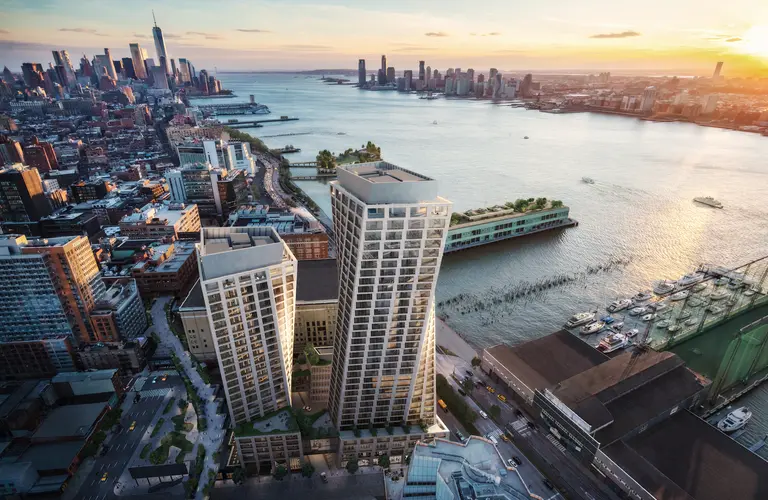How Joe Biden will affect NYC’s renters, real estate, and recovery

Photo by Gage Skidmore on Flickr
After Joe Biden is sworn in as the 46th president of the United States on Wednesday, his immediate focus will be getting the coronavirus pandemic under control and providing direct relief to Americans. In addition to immediate actions related to COVID-19, Biden’s Day 1 housing priorities include extending the federal nationwide moratorium on residential evictions through the end of September and sending an additional $25 billion in rental assistance to states. Down the road, Biden has proposed fewer developer-friendly policies than his predecessor, including a repeal of the 1031 exchange and reform of the Opportunity Zone tax program. But overall, there is optimism among New York City real estate industry experts who see a Biden Administration as a way to restore stability and consumer confidence. With a pledge to defeat COVID-19 and send federal support to New York City, there’s hope on the horizon for the city’s recovery.
The real estate developer-in chief has left the White House. What will change under President Biden?
Biden is expected to roll back and reform a number of programs under President Trump’s 2017 Tax Cuts and Jobs Act (TCJA). This could include raising the corporate tax rate back to 28 percent after it was lowered to 21 percent under the legislation and raising taxes on individuals earning over $400,000.
The TCJA also implemented a $10,000 cap on deductions of state and local taxes, or SALT. Democrats, especially from high-tax states like New York, New Jersey, and Connecticut, want to remove the cap, which they see as a politically-motivated way to raise revenue to offset the costs of tax cuts made in other places under the bill.
In 2018, Gov. Andrew Cuomo joined a multi-state lawsuit against Trump’s SALT cap, claiming the program is a way to raise taxes in predominantly Democratic states. A judge dismissed the suit the following year, but it is being heard by the 2nd U.S. Circuit Court of Appeals. “New York is already the nation’s leader in sending more tax dollars to Washington than we get back every year, and we will not allow this administration to pick the pockets of hard-working New Yorkers to fund tax cuts for corporations and send even more money to red states,” Cuomo said in a 2019 statement.
According to a report released last May by the state’s Rockefeller Insitute of Government, the total economic activity lost as a result of the SALT cap ranges between $14.4 billion and $24.5 billion, prior to the pandemic. And because of the higher housing prices and incomes in New York City compared to the rest of the state, housing prices dropped by 1.5 percent in the NYC Metro Area as a result of the cap, according to the report.
Sen. Chuck Schumer, now the Senate’s majority leader, has been a leading voice for repealing the SALT cap and proposed last year for it to be included in a coronavirus relief bill (it wasn’t). “We need to cushion the blow of this virus,” Schumer said during a press conference last summer, as The Hill reported. “The SALT cap hurts people affected by the virus. It hurts so many of the metropolitan areas like New York.”
Biden has also proposed repealing the 1031 exchange, a provision in the tax code that allows developers to defer taxes on investment properties if the capital gains are reinvested in a similar property, for real estate investors making over $400,000 in annual income. The current exchange allows real estate investors to shift investments while avoiding the need to pay a significant amount in taxes. By repealing it for certain high earning investors, revenue could be raised for other proposed programs.
The next administration is looking to reform the Opportunity Zone tax program, which gives developers tax breaks for investments made in low-income areas. According to Biden’s team, the program is not currently meeting its goal of spurring development and job growth in communities of color. His website cites a June 2020 report from the Urban Insitute that says a majority of Opportunity Zone projects are focused on “real estate transactions, not direct investments in operating businesses.”
There are 306 census tracts across the five boroughs that are designated as Opportunity Zones. According to the Citizens Housing Planning Council, 4 out of 10 housing units inside the zones are rent-stabilized and others are allocated in public housing complexes; 40 percent of the New York City Housing Authority’s 325 developments fall within an Opportunity Zone.
Some housing experts have expressed concern that the program could drive displacement of residents and encourage gentrification, all without a proper regulatory system in place. To reform the program, Biden wants to make projects in these zones have a community-based organization as a partner, increase oversight to make sure there are clear benefits to the designated areas, and make it more transparent by requiring those receiving a tax break to provide detailed reports and public disclosure on their investments and the impact on the local residents.
And last year, Trump repealed the Affirmatively Furthering Fair Housing rule, a 2015 law that required local governments receiving federal housing financing to examine housing patterns and identify and address policies that have a discriminatory effect. Biden plans to reinstate the rule.
Rental assistance and a moratorium on eviction and foreclosures are on Biden’s Day 1 agenda.
There are actions Biden has pledged to pursue immediately upon taking office on Wednesday. Under his $1.9 trillion “American Rescue Plan,” which creates a national vaccination program, sends additional stimulus checks, extends unemployment insurance, and provides funding for state and local governments, New York could receive about $54 billion in federal funding.
Biden said he will call for the current Centers for Disease Control and Prevention’s nationwide moratorium on evictions and foreclosures, set to expire at the end of the month, to be extended until September 30, 2021. This goes further than the freeze put in place by Gov. Andrew Cuomo, which was first enacted in March and extended last month through May. Other rent relief measures issued by the state include allowing renters to use their pre-paid security deposit for rent and banning fees for late payments. As many as 1.2 million families in New York are at risk of eviction, according to the New York Times.
Biden also wants to continue applications for forbearance on federally-guaranteed mortgages through the end of September and provide funds for legal assistance for households facing eviction or foreclosure.
As part of the second stimulus package signed by Trump last month, $25 billion in rental assistance was allocated to states, with New York receiving roughly $1.3 billion. “While the $25 billion allocated by Congress was an important down payment on the back rent accrued during this crisis, it is insufficient to meet the scale of the need,” the memo from Biden’s team reads.
He is calling for an additional $25 billion in assistance especially for “low- and moderate-income households who have lost jobs or are out of the labor market,” according to the plan. Biden proposes another $5 billion to cover home energy and water costs and outstanding bills of struggling renters through programs like the Low Income Home Energy Assistance Program.
What about landlords?
New York property owners want to be included in the conversation about the city’s recovery. Landlord groups have pushed for a rent voucher program, similar to Section 8, that would pay landlords directly, instead of canceling rent or extending the freeze on evictions. Joseph Strasburg, president of the Rent Stabilization Association, New York’s largest landlord advocacy organization, said President Biden’s relief package should include funding specifically for rent vouchers.
“President Biden’s reportedly $50 billion economic relief package to New York won’t be enough if it doesn’t earmark dollars specifically for a need-based, rent-voucher superfund for families that are unable to pay their rent due to health and financial hardship related to COVID-19,” Strasburg said in a statement to 6sqft.
“Like federal Section 8 and other government subsidies, rent-vouchers would be used only for rent payments. This wouldn’t be a bailout for landlords, but rather it would preserve housing, keep families in their homes, and prevent the financial collapse of New York City.”
Strasburg also argues that a voucher would help landlords pay their property taxes, which make up about half of the city’s tax revenue. Mayor Bill de Blasio last week announced that the city’s property tax revenues are expected to drop by $2.5 billion, the largest decline in nearly three decades.
“Rent vouchers would enable thousands of landlords – already standing on the ledge of tax default – to pay their property taxes,” Strasburg said. “In turn, the city would be able to maintain essential services and prevent layoffs of teachers, hospital workers and other essential employees – not to mention saving neighborhood economies and the thousands of jobs that depend on the food chain of landlords repairing and maintaining their buildings and paying water, heating and other bills.”
For the long-term, a comprehensive housing plan that sees housing as a right, not a privilege.
During his presidential campaign, Biden laid out a sweeping 10-year, $640 billion housing plan that centers around the idea that housing is a right, not a privilege. The plan, which will be led by Rep. Marcia Fudge if approved by the Senate to lead the U.S. Department of Housing and Urban Development, includes a $100 billion affordable housing fund to construct and upgrade developments, an expansion of the Section 8 housing voucher program to reach every eligible family, creation of a First Down Payment Tax Credit to help families buy their first home, and enaction of a renter’s tax credit to lower rent for low-income families who don’t qualify for Section 8.
Included in the plan is a comprehensive strategy to end homelessness, which includes the passage of Rep. Maxine Waters’ Ending Homelessness Act. The five-year $13 billion bill funds a “holistic” approach to ending homelessness in the country with the goal of creating 400,000 additional housing units for those experiencing homelessness, particularly children and young adults.
But the plan does not explicitly address investment in public housing, which will be critical for the New York City Housing Authority. Gregory Russ, the chair of NYCHA, estimated that the agency now needs $40 billion in capital to repair the thousands of public housing units that are home to more than 400,000 New Yorkers.
With the coronavirus vaccine here and federal funding on the way, there’s hope for the recovery of NYC’s real estate industry.
Because of COVID-19 and the anxiety surrounding the presidential election, it was a rough year for real estate in New York City, with residential sales plummeting by 40 percent in July and 57 percent in August compared to last year, according to a report from Comptroller Scott Stringer’s office and average rents still down.
But following the election of Biden last year, the market in Manhattan saw a “post-election” bump in November and December, according to a report from SERHANT. In Manhattan, 927 sales contracts were signed in November, an increase of 5.1 percent compared to last year, and 802 contracts were signed in December, a year-over-year increase of 8.4 percent.
“While it is still too early to tell, if this trend holds, we may be looking at a robust 2021,” Garrett Derderian, director of market intelligence at SERHANT, said earlier this month in a press release.
Derderian added: “At this point, it is safe to say the notion that ‘everyone is fleeing the city’ is outdated. People did leave, but that happened in the spring and early summer – and many who left were renters. Now we see buyers returning, eager to take advantage of falling prices. Your dollar goes a lot farther than it used to. If you are looking to negotiate for that once-in-a-lifetime deal, now may be the best time.”
While it’s unlikely the NYC market will return to “normal” any time soon, real estate experts see a Biden presidency as a way to restore stability and security. Plus, the arrival of the COVID-19 vaccine, despite its sluggish rollout, provides hope for the city’s broader recovery, according to Noemi Bitterman, a real estate agent with Compass.
“We’re going to have stability. We’re going to have someone that has an administration of men and women that we not only support but respect,” Bitterman told 6sqft. “They give us that confidence and credibility that we’ve been missing all of this time.”
As part of his emergency recovery plan, Biden plans to provide much-needed funding to state and local governments and $20 billion in relief to “hardest hit transit agencies” which no doubt includes the Metropolitan Transportation Authority, currently facing its worst financial crisis in history. Funding for the MTA and transit projects, including the crucial Gateway Program, is seen as necessary for New York City and its economy to recover.
“Once things calm down–which they will–people will be back,” Bitterman said. “The job opportunity, the culture, the vibe of New York City, you can’t duplicate that anywhere else.”




























